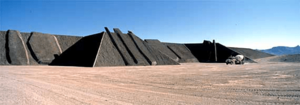City (artwork) facts for kids

City is a giant outdoor sculpture, a type of earth art, built right into the desert landscape. It's located in a quiet desert area called Garden Valley in Nevada, USA. The artist, Michael Heizer, started building it way back in 1972, and he's still working on it! When it's finished, City will be one of the biggest sculptures ever made.
City is planned to open to the public in 2020.
What is City?
Just like Heizer's earlier work, Double Negative, City is made on a huge scale. It stretches for about one and a quarter miles long and more than a quarter of a mile wide. That's like two kilometers long and 0.4 kilometers wide! Imagine a sculpture as big as a small town.
The artist uses natural materials like earth, rocks, and sand, along with concrete. He builds it using big construction machines. The sculpture has five main parts, and each part has many structures. Some of these structures are as tall as an eight-story building, reaching eighty feet high!
Heizer got the idea for City from ancient buildings and monuments he saw, like those at Chichen Itza in Mexico. He also wanted to combine the simple shapes of Minimalism art with modern building tools. Heizer was also interested in the big open spaces and important buildings found in old cities.
Who Manages City?
Building City costs a lot of money. Several art groups, like the Dia Art Foundation and Lannan Foundation, are helping to pay for it. It's estimated to cost over twenty-five million US dollars.
The sculpture is on private land that belongs to the artist. Because of this, it's not open to visitors until it's completely finished. Heizer is still working on it with a team of about a dozen people. Even though it's not open, you can find photos of City online. It's hard to see from the road because it's built to face away from it, and there are big dirt walls blocking the view.
Protecting City
Over the years, the desert area where City is located has faced threats from big construction projects.
In the 1970s and early 1980s, the government planned to build many railroad tracks across the valley. These tracks would have carried special missiles. However, President Ronald Reagan stopped this plan.
Later, there was a proposal for a nuclear waste storage site called the Yucca Mountain Repository. This project would have included a new railroad line that would cross Garden Valley, coming very close to City. Heizer even thought about burying his sculpture if this railroad was built to protect it.
In 2014, U.S. Senator Harry Reid from Nevada introduced a bill. This bill, called the “Garden Valley Withdrawal Act,” aimed to protect the land around City. It would save over 800,000 acres of federal land from mining and energy development. Senator Reid had visited the area in 2007 and had tried to pass a similar bill before.
In early 2015, many important American museums, like the Los Angeles County Museum of Art and the Museum of Modern Art, joined together. They urged the government to protect the area around City.
Finally, in July 2015, the area became part of a new protected space called the Basin and Range National Monument. This special monument status means that no new railroads, power lines, or other big developments can be built there. This helps keep City and the surrounding desert safe for the future.

